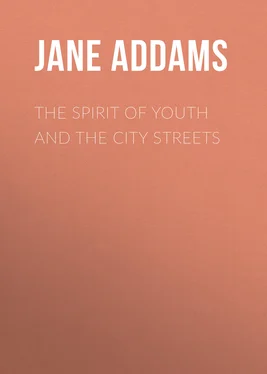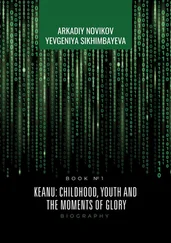Jane Addams - The Spirit of Youth and the City Streets
Здесь есть возможность читать онлайн «Jane Addams - The Spirit of Youth and the City Streets» — ознакомительный отрывок электронной книги совершенно бесплатно, а после прочтения отрывка купить полную версию. В некоторых случаях можно слушать аудио, скачать через торрент в формате fb2 и присутствует краткое содержание. Жанр: popular_business, foreign_edu, на английском языке. Описание произведения, (предисловие) а так же отзывы посетителей доступны на портале библиотеки ЛибКат.
- Название:The Spirit of Youth and the City Streets
- Автор:
- Жанр:
- Год:неизвестен
- ISBN:нет данных
- Рейтинг книги:5 / 5. Голосов: 1
-
Избранное:Добавить в избранное
- Отзывы:
-
Ваша оценка:
- 100
- 1
- 2
- 3
- 4
- 5
The Spirit of Youth and the City Streets: краткое содержание, описание и аннотация
Предлагаем к чтению аннотацию, описание, краткое содержание или предисловие (зависит от того, что написал сам автор книги «The Spirit of Youth and the City Streets»). Если вы не нашли необходимую информацию о книге — напишите в комментариях, мы постараемся отыскать её.
The Spirit of Youth and the City Streets — читать онлайн ознакомительный отрывок
Ниже представлен текст книги, разбитый по страницам. Система сохранения места последней прочитанной страницы, позволяет с удобством читать онлайн бесплатно книгу «The Spirit of Youth and the City Streets», без необходимости каждый раз заново искать на чём Вы остановились. Поставьте закладку, и сможете в любой момент перейти на страницу, на которой закончили чтение.
Интервал:
Закладка:
We not only fail in this undertaking but even debase existing forms of art. We are informed by high authority that there is nothing in the environment to which youth so keenly responds as to music, and yet the streets, the vaudeville shows, the five-cent theaters are full of the most blatant and vulgar songs. The trivial and obscene words, the meaningless and flippant airs run through the heads of hundreds of young people for hours at a time while they are engaged in monotonous factory work. We totally ignore that ancient connection between music and morals which was so long insisted upon by philosophers as well as poets. The street music has quite broken away from all control, both of the educator and the patriot, and we have grown singularly careless in regard to its influence upon young people. Although we legislate against it in saloons because of its dangerous influence there, we constantly permit music on the street to incite that which should be controlled, to degrade that which should be exalted, to make sensuous that which might be lifted into the realm of the higher imagination.
Our attitude towards music is typical of our carelessness towards all those things which make for common joy and for the restraints of higher civilization on the streets. It is as if our cities had not yet developed a sense of responsibility in regard to the life of the streets, and continually forget that recreation is stronger than vice, and that recreation alone can stifle the lust for vice.
Perhaps we need to take a page from the philosophy of the Greeks to whom the world of fact was also the world of the ideal, and to whom the realization of what ought to be, involved not the destruction of what was, but merely its perfecting upon its own lines. To the Greeks virtue was not a hard conformity to a law felt as alien to the natural character, but a free expression of the inner life. To treat thus the fundamental susceptibility of sex which now so bewilders the street life and drives young people themselves into all sorts of difficulties, would mean to loosen it from the things of sense and to link it to the affairs of the imagination. It would mean to fit to this gross and heavy stuff the wings of the mind, to scatter from it "the clinging mud of banality and vulgarity," and to speed it on through our city streets amid spontaneous laughter, snatches of lyric song, the recovered forms of old dances, and the traditional rondels of merry games. It would thus bring charm and beauty to the prosaic city and connect it subtly with the arts of the past as well as with the vigor and renewed life of the future.
CHAPTER II
THE WRECKED FOUNDATIONS OF DOMESTICITY
"Sense with keenest edge unused
Yet unsteel'd by scathing fire:
Lovely feet as yet unbruised
On the ways of dark desire!"
These words written by a poet to his young son express the longing which has at times seized all of us, to guard youth from the mass of difficulties which may be traced to the obscure manifestation of that fundamental susceptibility of which we are all slow to speak and concerning which we evade public responsibility, although it brings its scores of victims into the police courts every morning.
At the very outset we must bear in mind that the senses of youth are singularly acute, and ready to respond to every vivid appeal. We know that nature herself has sharpened the senses for her own purposes, and is deliberately establishing a connection between them and the newly awakened susceptibility of sex; for it is only through the outward senses that the selection of an individual mate is made and the instinct utilized for nature's purposes. It would seem, however, that nature was determined that the force and constancy of the instinct must make up for its lack of precision, and that she was totally unconcerned that this instinct ruthlessly seized the youth at the moment when he was least prepared to cope with it; not only because his powers of self-control and discrimination are unequal to the task, but because his senses are helplessly wide open to the world. These early manifestations of the sex susceptibility are for the most part vague and formless, and are absolutely without definition to the youth himself. Sometimes months and years elapse before the individual mate is selected and determined upon, and during the time when the differentiation is not complete—and it often is not—there is of necessity a great deal of groping and waste.
This period of groping is complicated by the fact that the youth's power for appreciating is far ahead of his ability for expression. "The inner traffic fairly obstructs the outer current," and it is nothing short of cruelty to over-stimulate his senses as does the modern city. This period is difficult everywhere, but it seems at times as if a great city almost deliberately increased its perils. The newly awakened senses are appealed to by all that is gaudy and sensual, by the flippant street music, the highly colored theater posters, the trashy love stories, the feathered hats, the cheap heroics of the revolvers displayed in the pawn-shop windows. This fundamental susceptibility is thus evoked without a corresponding stir of the higher imagination, and the result is as dangerous as possible. We are told upon good authority that "If the imagination is retarded, while the senses remain awake, we have a state of esthetic insensibility,"—in other words, the senses become sodden and cannot be lifted from the ground. It is this state of "esthetic insensibility" into which we allow the youth to fall which is so distressing and so unjustifiable. Sex impulse then becomes merely a dumb and powerful instinct without in the least awakening the imagination or the heart, nor does it overflow into neighboring fields of consciousness. Every city contains hundreds of degenerates who have been over-mastered and borne down by it; they fill the casual lodging houses and the infirmaries. In many instances it has pushed men of ability and promise to the bottom of the social scale. Warner, in his American Charities , designates it as one of the steady forces making for failure and poverty, and contends that "the inherent uncleanness of their minds prevents many men from rising above the rank of day laborers and finally incapacitates them even for that position." He also suggests that the modern man has a stronger imagination than the man of a few hundred years ago and that sensuality destroys him the more rapidly.
It is difficult to state how much evil and distress might be averted if the imagination were utilized in its higher capacities through the historic paths. An English moralist has lately asserted that "much of the evil of the time may be traced to outraged imagination. It is the strongest quality of the brain and it is starved. Children, from their earliest years, are hedged in with facts; they are not trained to use their minds on the unseen."
In failing to diffuse and utilize this fundamental instinct of sex through the imagination, we not only inadvertently foster vice and enervation, but we throw away one of the most precious implements for ministering to life's highest needs. There is no doubt that this ill adjusted function consumes quite unnecessarily vast stores of vital energy, even when we contemplate it in its immature manifestations which are infinitely more wholesome than the dumb swamping process. Every high school boy and girl knows the difference between the concentration and the diffusion of this impulse, although they would be hopelessly bewildered by the use of the terms. They will declare one of their companions to be "in love" if his fancy is occupied by the image of a single person about whom all the newly found values gather, and without whom his solitude is an eternal melancholy. But if the stimulus does not appear as a definite image, and the values evoked are dispensed over the world, the young person suddenly seems to have discovered a beauty and significance in many things—he responds to poetry, he becomes a lover of nature, he is filled with religious devotion or with philanthropic zeal. Experience, with young people, easily illustrates the possibility and value of diffusion.
Читать дальшеИнтервал:
Закладка:
Похожие книги на «The Spirit of Youth and the City Streets»
Представляем Вашему вниманию похожие книги на «The Spirit of Youth and the City Streets» списком для выбора. Мы отобрали схожую по названию и смыслу литературу в надежде предоставить читателям больше вариантов отыскать новые, интересные, ещё непрочитанные произведения.
Обсуждение, отзывы о книге «The Spirit of Youth and the City Streets» и просто собственные мнения читателей. Оставьте ваши комментарии, напишите, что Вы думаете о произведении, его смысле или главных героях. Укажите что конкретно понравилось, а что нет, и почему Вы так считаете.












